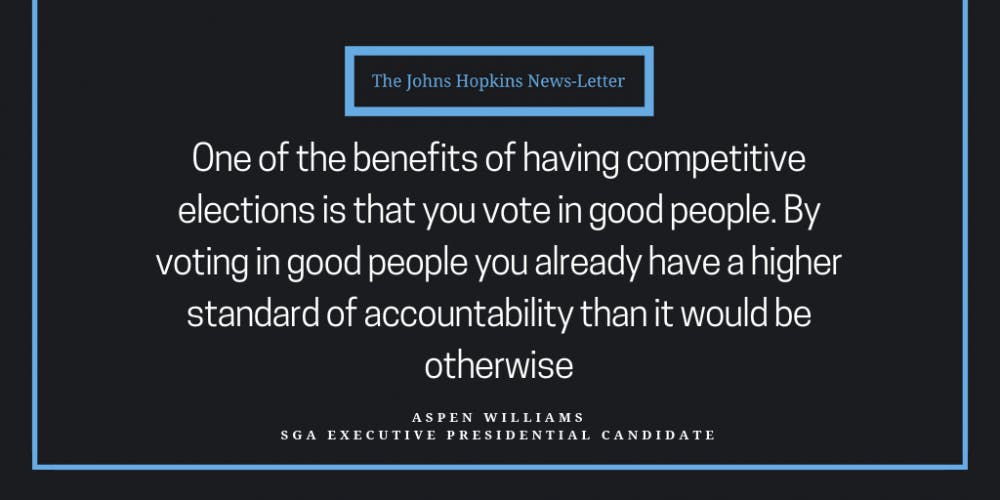Candidates for the Student Government Association (SGA) executive election discussed their platforms at a debate on Tuesday. This year, two tickets are running — Hop Forward and Change. Junior Claire Gorman is running independently for executive vice president.
The Hop Forward ticket includes sophomore Aspen Williams for executive president, Dean Chien for executive vice president, Pritika Parmar for executive secretary and Nathan Mudrak for executive treasurer.
The Change ticket is comprised of junior Jessup Jong for executive president, Ahmed Elzokm for executive secretary and Eric Armstrong for executive treasurer.
SGA Executive President AJ Tsang moderated the debate and asked questions solicited from members of the student body. The Committee on Student Elections (CSE) had previously released a form allowing students to submit questions.
Tsang asked the candidates how they feel the SGA is positioned to make changes in the academic and personal lives of students, given the power and decision-making role that SGA possesses.
Williams emphasized coalition-building. In her view, the executive board has to build relationships horizontally, with student leaders and student organizations, and vertically with administration.
“SGA is the nexus of student representation,” she said. “Everyone on our ticket has been on SGA, and we have done great work in building up student voices so that they can be heard by administration.”
Jong agreed that members of the SGA should be liaisons between the student body and administration.
“We have to represent the interests of the students,” he said. “Yes, being cordial is important but we have to advocate and say, ‘Listen, what we have to say is important.’”
Armstrong noted that the SGA also has to ensure that key administrative decisions consider student opinion. In particular, he expressed frustration with how he felt the University ignored SGA’s concerns about the proposed Hopkins police force.
“We are neutral arbitrators of student concerns and conduits for student voice,” he said. “One of our most important roles is to keep admin in check from acting unilaterally on issues.”
An audience member asked the candidates how they would ensure that legislation will address the needs of groups which make up a smaller proportion of students on campus, like students with disabilities, and not just large student groups.
Jong said that he would make it a priority to address the concerns of minority student populations on campus — citing buildings on campus, which are not accessible to students with disabilities, as a major issue.
“Disability is not a fringe issue, so it will get the attention it needs,” he said, “We want more communication with the disability office.”
Williams said that in an effort to diversify the field of candidates who represent a broad range of values, she contacted multicultural and activist groups on campus to put forth candidates to run.
“There are so many niches and JHU is so multifaceted that it is important that we reach out to the far reaches of the University and that we talk to all mental health organizations and all activist organizations,” she said.
Williams believes that this year’s competitive pool of applications is already a good first step to ensure that those who are voted into the executive board are passionate and committed to their roles.
“One of the benefits of having competitive elections is that you vote in good people. By voting in good people you already have a higher standard of accountability than it would be otherwise,” she said.
The remainder of the debate turned to the candidates discussing their plans to ensure that the SGA is efficient and to promote a positive culture within the SGA.
Gorman expressed that currently in SGA there is very little guidance for new members. She emphasized that if she were elected, she would institute a mentorship program, where newer members would receive guidance on how to write bills and conduct meetings. She also stressed that because she is member of A Place To Talk, she is well-aware of how to reconstruct SGA culture to promote listening to each other.
“Although we are debating issues, there are ways to listen to people with respect and respond with empathy,” she said.
The candidates discussed possible changes to the voting system to increase student participation in the elections. In 2010, 2,000 students voted. In 2018, the turnout was 500 students. That year, the CSE implemented the rank-choice voting system. The results left multiple senator positions vacant and required intervention from the Judiciary Committee.
None of the candidates believed that the voting system needed to be changed. Jong argued that a lack of student involvement, not a poor voting system, resulted in senate vacancies.
“The student atmosphere is the problem. Students feel that their voices are not being heard, that is why there is apathy,” Jong said.
The debate then turned to the budget approval process for student organizations. Currently, organizations have to submit requests for room reservations and funding at least 10 business days in advance of the event for approval.
All the candidates agreed that the process should be streamlined.
Gorman said that she has personally experienced problems with the system. According to her, requests that are made past the 10 business day deadline are seen by the staff, but they are automatically denied.
“Clearly, there is no reason for the 10 business days as long as they are able to see [the request]. My biggest recommendation would be that you have to submit it before 10 business days deadline only if you want a guaranteed view for the event,” she said.
Chien is the current chair of the Committee on Student Organizations. He explained that the 10-day deadline was intended to make the policy versatile so that it could apply to events ranging from small general body meetings to large events held on the quad.
“In my talks with SLI [Student Leadership and Involvement] staff — I have great working relationships with all of them — they are willing to change [the policy],” he said.
Chien also said that online modules allowing student groups to view their budgets in real-time on Hopkins Groups will be released soon. The program is currently being tested for glitches.
Elzokm believes that the reimbursement process for events held by Resident Advisors (RAs) should be a model for the general budget distribution for student organizations. RAs buy items out-of-pocket and then are reimbursed.
“The process is pretty much hassle-free. That’s because the University trusts you to use that money well and be honest with it. It comes down to a matter of trust between Hopkins and student groups,” he said.
The debate shifted to how qualified each candidate is for the position they are running for. Tsang described the executive board as a very steep learning curve.
Mudrak believes that his experience as a freshman class senator would be beneficial were he selected for the executive board.
“We are the ticket of institutional memory and with that comes innately a solution to the learning curve,” he said.
Jong viewed the fact that he has not been a member of the SGA as a resistance to the status quo.
“Having no experience will propel us to bring better change and pursue larger initiatives,” he said.
According to Armstrong, work ethic, as opposed to incumbency, was the determining factor in overcoming the learning curve.
The debate concluded with all the candidates affirming that if they are voted into office, they would maintain strong working relationships with their fellow members on the executive board, even if they are not their running mates.





